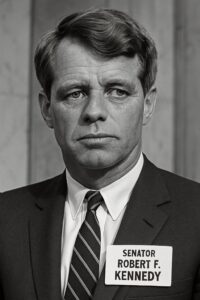On June 5, 1968, just after midnight, the voice of hope for a divided America was abruptly silenced. Senator Robert F. Kennedy, younger brother of the late President John F. Kennedy, had just delivered a victory speech at the Ambassador Hotel in Los Angeles after winning the California Democratic primary. Moments later, as he walked through a kitchen pantry toward a press room, he was shot multiple times by a young man named Sirhan Sirhan. Kennedy succumbed to his wounds the following day, and with his death, a nation already reeling from the assassinations of his brother and Dr. Martin Luther King Jr. lost yet another symbol of unity and progress.
RFK was more than a political figure—he was a force of compassion and change during a time of great unrest. With the Vietnam War escalating and civil rights tensions boiling, Kennedy offered a rare blend of moral conviction and political courage. He spoke to the working class, to the disenfranchised, to the youth. He wasn’t just running for president; he was running for a better future. That’s why his assassination didn’t just take a man—it took momentum, it shook faith, and it deepened the wounds of a country on the edge.
What makes RFK’s death even more heartbreaking is the promise that was never fulfilled. He had begun to transcend the old political order, appealing to people across racial and economic lines. In many ways, his campaign felt like a movement, not just an election bid. When he fell, so did the dreams of millions who believed he could heal a wounded nation. Today, more than five decades later, we still feel the echo of that gunshot, a cruel reminder of what might have been.

